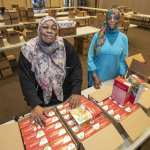This collection, Portraits of a Pandemic, is a co-production between The Philadelphia Inquirer and The 19th. This work is supported by the Pulitzer Center and The Lenfest Institute.
Ask Blew Kind when she knew the pandemic had hit her cafe, Franny Lou’s Porch in East Kensington, and she doesn’t hesitate: the second week of March, when sales went from more than $500 a week to just $88.
Normally, Franny Lou’s Porch — named for poet and writer Frances Harper and activist Fannie Lou Hamer — is warm and welcoming, with walls covered in art, fliers advertising local goings-on, and shelves lined with books on social justice and the history of marginalized groups. It’s also a gathering space to organize, recharge, and engage in fellowship. Menu items reflect the cafe’s mission: Sandwiches are called “The Anti-Capitalist” and “Pro-Love.” Teas like “The Sparrow’s Fall” and “Songs for the People” are named after poems by Harper.
Kind — 32 and a mother of three children, ages 8, 5, and 9 months — employed a dozen workers, and the cafe at Coral and York Streets had become a local cornerstone since opening in 2015. Quickly, customers were fearful to leave home. And the cafe’s catering business suffered, too, as other small businesses around the city shut their doors.
“We lost a week’s worth of food because it happened so quickly,” Kind said. “It was not being sold at the rate we were selling. We lost four to five thousand dollars just in wholesale catering orders.”
Philadelphia is a city of proud neighborhoods, with small businesses often central to the identity of a corner, street, or block. An estimated one in four of those small businesses are Black-owned, even as African Americans comprise 44% of the city’s population.
According to U.S. census data from 2012, women make up more than 35% of America’s small business owners; minorities are less than 30%.
The pandemic has exposed disparities in access to resources small businesses can use to survive the crisis or recover upon reopening.
The federal government’s Paycheck Protection Program is mainly lending to existing customers, and many business owners of color lack such relationships. As a result, a recent report by the Center for Responsible Lending found that 95% of Black-owned businesses, 91% of Latino-owned businesses and 75% of Asian-owned businesses “stand close to no chance of receiving a PPP loan through a mainstream bank or credit union.”
Kind didn’t meet the criteria to apply for federal funding to bridge her income gap. To keep as many of her workers as possible, she cut hours at the cafe and has tried to boost morale while trying to minimize signs that she’s worried. She started a GoFundMe drive for her remaining 10 employees.
And when the doors closed, Kind made a window.
The idea, she said, came to her soon after her worst week. As she mourned the in-person atmosphere of Franny Lou’s to a friend outside the cafe, she saw a pair of double doors from a new perspective.
Within hours, she enlisted her partner and children to transform the space, using building materials and paint that were in the cafe’s basement. Two days later, the side window was taking orders.
“I was so happy afterward that it was exactly what I saw in my mind,” Kind said. “We definitely had a loss, and I sat with it. But we’re starting a new chapter and going in a different direction, and I think we’ll be strong coming out of this.”






